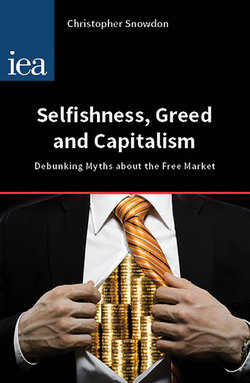Читать книгу Selfishness, Greed and Capitalism - Christopher Snowdon - Страница 17
На сайте Литреса книга снята с продажи.
Rational consumers and irrational voters
ОглавлениеCritics of free markets believe that they have spotted a contradiction between economists’ belief in rational individuals in the marketplace and irrational individuals in a democracy – a paradox satirically characterised by one commentator as ‘everyone is rational, except policymakers’ (Quiggin 2010: 107). At first glance, this seems to be as incoherent as socialists’ faith in rational government and irrational markets. Why would a rational consumer suddenly become irrational when he enters a voting booth?
The answer is simple and, like so much economics, it comes down to incentives. Voters have little incentive to be knowledgeable about politics and – crucially – can afford to be wrong. A single vote almost never decides an election. The individual can cast his vote in the near-certain knowledge that it will make no difference to the result. He has scant incentive to vote at all, let alone to read up on each and every policy the candidates claim to stand for. Many people do vote, of course, perhaps out of a sense of duty or to express themselves, but the opportunity cost of voting is trivial – a few minutes going to the polls or filling out a postal vote10 – whereas the effort required in mastering the issues is enormous. An ill-informed decision at the ballot box has practically no private cost to the individual. Even in the extremely unlikely event of his vote being decisive, the costs of electing a fool or a knave will be dispersed over a large population. In short, voters can afford to indulge their irrational impulses at virtually zero cost every few years.
This is very different from being irrational with one’s own money in the market. A poor decision in the marketplace will cost us our hard-earned money. A mistake at work might cost us our job. It is because the private costs of making a bad choice are so much greater when our own money is at stake that we are incentivised to gather information and choose carefully when making a purchase in the marketplace. The more expensive the item, the greater the incentive we have to educate ourselves about what we are buying. In financial transactions, it is rational to spend time gathering knowledge about the options. In politics, unless you are a journalist, politician or lobbyist, it is rational to ignore the whole circus and spend one’s time more productively. ‘Voting is not a slight variation on shopping,’ says Caplan (2007: 140–41). ‘Shoppers have incentives to be rational. Voters do not.’ There is, therefore, no contradiction between being a rational actor in the market and an irrational or ignorant participant (or abstainer) in a democracy.
10 Despite this, evidence suggests that many people do not place a great value on their vote. More than a third of registered voters did not cast a ballot in the last UK general election. The fact that bad weather reduces voter turnout implies that some people think their vote is worth less than a relatively trivial opportunity cost.
